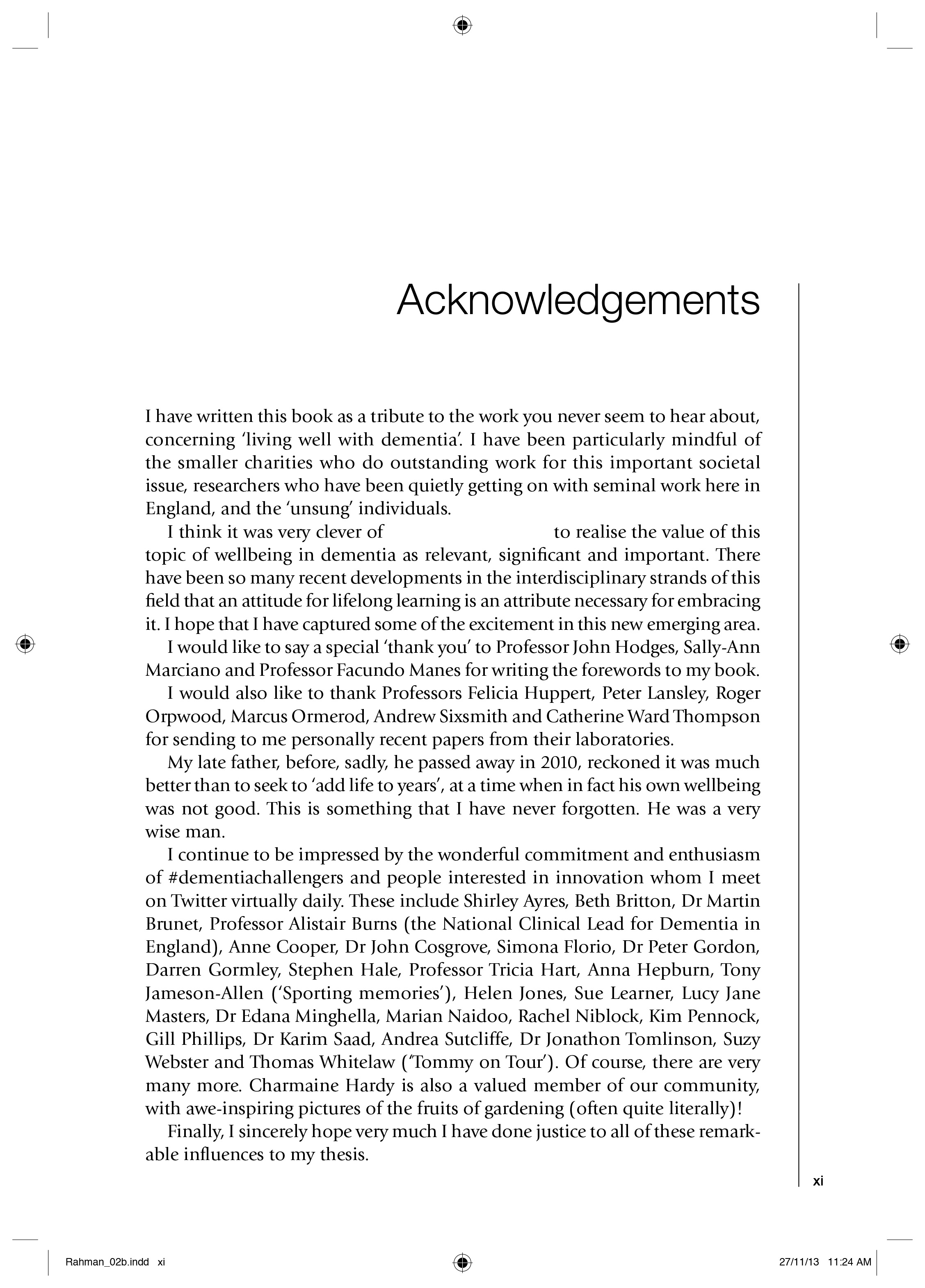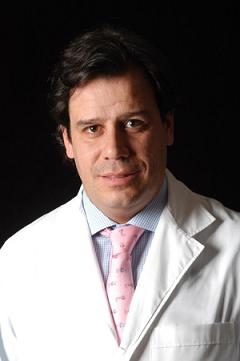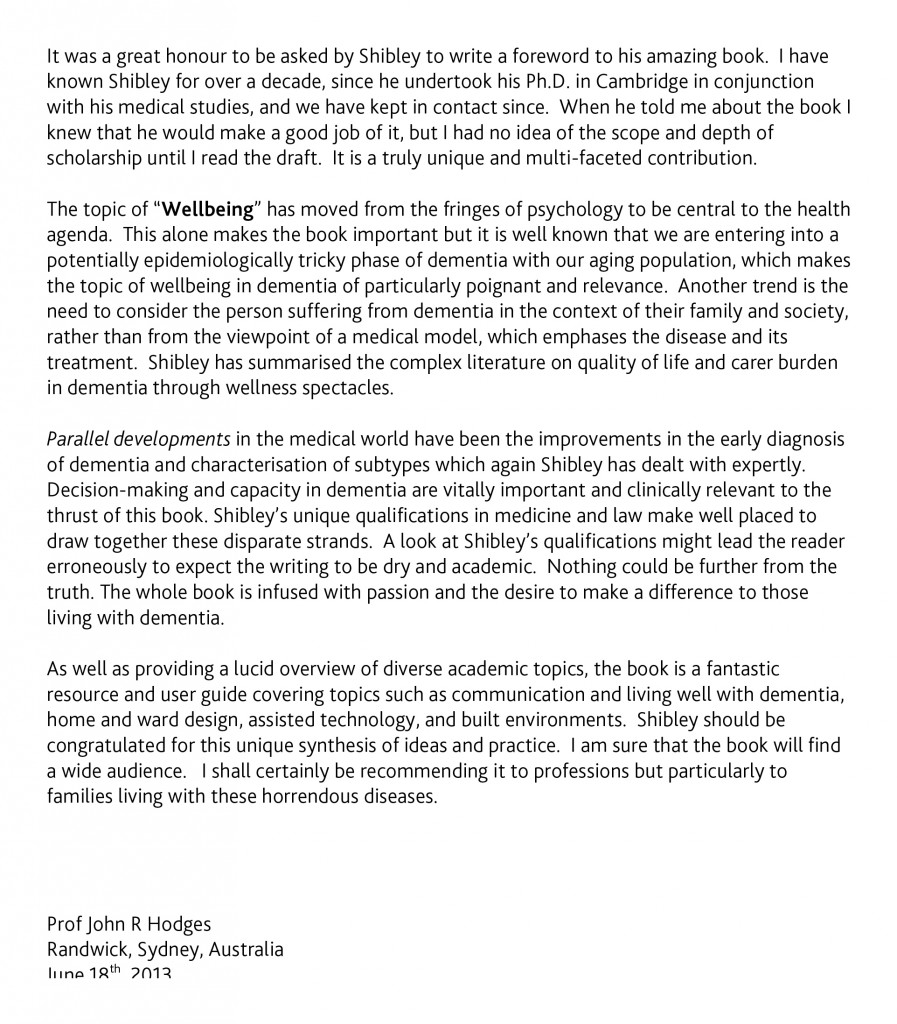Home » Book (Page 4)
I have now signed off the final proofs
I have now ‘signed off’ the final proofs. The next thing is to organise a book launch evening for friends who’ve been following the progress of the book. Please let me know if you wish to be invited at livingwelldementia@gmail.com, though it’s fairly certain I will be inviting you anyway if I’ve been in regular contact on my Twitter accounts @legalaware or @dementia_2014.
Foreword by Prof Facundo Manes
This is a Foreword to my book entitled ‘Living well with dementia‘, a 18-chapter book looking at the concept of living well in dementia, and practical ways in which it might be achieved. Whilst the book is written by me (Shibley), I am honoured that this particular Foreword is written by Prof Facundo Manes.
There are two other Forewords that also make for a brilliant introduction to my book.
Sally-Ann Marciano’s Foreword is here.
Prof John Hodges’ Foreword is here.
Prof Manes’ biography is here (translation by Google Translate):
“Facundo Manes is an Argentinian neuroscientist. He was born in 1969, and spent his childhood and adolescence in Salto, Buenos Aires Province. He studied at the Faculty of Medicine, University of Buenos Aires, where he graduated in 1992, and then at the University of Cambridge, England (Master in Sciences). After completing his postgraduate training abroad (USA and England) he returned to the country with the firm commitment to develop local resources to improve clinical standards and research in cognitive neuroscience and neuropsychiatry.
He created and currently directs INECO (Institute of Cognitive Neurology) and the Institute of Neurosciences, Favaloro Foundation in Buenos Aires City. Both institutions are world leaders in original scientific publications in cognitive neuroscience. He is also President of the World Federation of Neurology Research Group on Aphasia and Cognitive Disorders (RGACD) and of the Latin American Division of the Society for Social Neuroscience. Facundo Manes has taught at the University of Buenos Aires and the Universidad Católica Argentina. He is currently Professor of Neurology and Cognitive Neuroscience, Faculty of Medicine and Psychology of the Favaloro University and was appointed Professor of Experimental Psychology at the University of South Carolina, USA.
He has published over 100 scientific papers in the most prestigious original specialised international journals such as Brain and Nature Neuroscience. He has also given lectures at several international scientific fora as the “Royal Society of Medicine” (London) and the “New York Academy of Sciences”, among others. His current area of ??research is the neurobiology of mental processes. He believes in the importance of scientific disclosure for Society. He led the program ” The Brain Enigmas ” on Argentina TV and wrote many scientific articles in the national press. Finally, Prof. Facundo Manes is convinced that the wealth of a country is measured by the value of human capital , education, science and technology, and that there is the basis for social development.
This biography wants to put on record this journey. And the beginning of the future.”
FOREWORD TO ‘LIVING WELL WITH DEMENTIA’ BY PROFESSOR FACUNDO MANES, PROFESSOR OF NEUROLOGY AND COGNITIVE NEUROSCIENCE AT FAVAROLO UNIVERSITY, BUENOS AIRES, ARGENTINA AND CO-CHAIR OF THE WORLD FEDERATION OF NEUROLOGY APHASIA/COGNITIVE DISORDERS RESEARCH GROUP
A timely diagnosis of dementia can be a gateway to appropriate care for that particular person. Whilst historically an emphasis has been given to medication, there is no doubt that understanding the person and his or her environment is central to dementia care. Shibley’s book will be of massive help to dementia researchers worldwide in my view, as well as to actual patients and their carers, and is great example of the practical application of research. For patients with dementia, the assistance of caregivers can be necessary for many activities of daily living, such as medication management, financial matters, dressing, planning, and communication with family and friends. The majority of caregivers provide high levels of care, yet at the same time they are burdened by the loss of their loved ones. Interventions developed to offer support for caregivers to dementia patients living at home include counselling, training and education programmes, homecare/health care teams, respite care, and information technology based support. There is evidence to support the view that caregivers of patients with dementia especially benefit from these initiatives.
I am currently the Co-Chair of Aphasia/Cognitive Disorders Research Group of the World Federation of Neurology (WFN RG ACD). In this group, we also have a specialist interest in world dementia research. “Wellbeing” is notoriously difficult to define. Indeed, the World Health Organization indirectly defines wellbeing through its definition of mental health:
“Mental health is defined as a state of well-being in which every individual realizes his or her own potential, can cope with the normal stresses of life, can work productively and fruitfully, and is able to make a contribution to her or his community.” (WHO, 2011)
Such a definition necessarily emphasises the potential contribution of a person to society. Some people who participate in research are voluntarily contributing to society. Irrespective of the importance that they assign to their own wellbeing, it is the duty and responsibility of researchers to protect participants’ wellbeing and even to contribute towards it if possible. Participating in research can and should be a positive experience.
I felt that there is much ‘positive energy’ in dementia research around the world. Dementia research is very much a global effort, and many laboratories work in partnership both nationally and internationally, where expertise can be pooled and more progress can be made through collaborative efforts.
In England, the support and funding of world-class health research in the best possible facilities by NIHR, Medical Research Council, the Economic and Social Research Council and the Research Charities is vital to the development of new and better treatments, diagnostics and care. Likewise, the “World Brain Alliance” is working toward making the brain, its health, and its disorders the subject of a future United Nations General Assembly meeting. As part of this effort, a “World Brain Summit” is being planned for 2014, Europe’s “Brain Year,” to create a platform involving professional organisations, industry, patient groups, and the public in an effort to set a World Brain Agenda.
It is certainly appropriate to think these are exciting times, at last, for living well with dementia.
Prof Facundo Manes
Buenos Aires,?Argentina
24th August 2013
References
Mental health: a state of wellbeing. [October 2011]
Foreword by Sally Marciano
I am very grateful to Sally-Ann for writing a Foreword to my book on ‘Living well with dementia’. The other Foreword has been written by Prof John Hodges, Professor of Cognitive Neurology, NEURA Australia and Emeritus Professor of Behavioural Neurology Cambridge University. Sally-Ann offers an unique perspective regarding her father’s own dementia, especially as she is a trained nurse. Sally-Ann’s journey, I feel, shows how in its purest form a “medical model” can fail patients, and a person-centred approach might be much positive for all. Prof. Hodges and I feel deeply honoured that Sally-Ann has added her enormously valuable contributions here.
FOREWORD TO ‘LIVING WELL WITH DEMENTIA’ BY SALLY-ANN MARCIANO, PROJECT SPECIALIST, SKILLS UTILISATION PROJECT, SKILLS FOR HEALTH, BRISTOL.
I feel a tremendous honour that I have been asked to write a foreword to Shibley’s outstanding book. I am not an academic but I am a nurse, whose wonderful father died of Alzheimer’s in September 2012. Nothing during my training or nursing career could have prepared me for the challenge that came with supporting my mother in my father’s journey with dementia. I have never met Shibley in person, which makes being asked to write this even more special. What we do have in common, however, is real passion for raising profile of dementia and a hope that we can – one day –improve care for all those living with dementia.
Many people with dementia will live for many years after their diagnosis, and it should be everyone’s ambition in health and social care to ensure that those living with dementia do so as well as possible for all of the remaining years of their life. Diagnosis is just the start of the journey, and, with that, should come full care and support to allow those with dementia to live where they wish, and with their closest present every step of the way.
Sadly my father’s experience revealed a system where no one appeared to take direct responsibility for his care or support. He was, rather, classified as a “social care problem”, and as a result, he had to fund his own care. Even when he was dying, his care was classified as “basic” so that he did not even qualify for funded health care. Our only visit was once-a-year from the memory nurse, and, as his condition declined, my once intelligent, articulate father, who did not even know my name towards the end, needed total care.
Dementia of Alzheimer type destroyed his brain so badly that my father was unable to feed himself, mobilise, or verbalise his needs. He became totally dependent on my mother 24/7. As the condition advanced, my father became increasingly frail, with recurrent chest infections due to aspiration from swallowing difficulties. Each time the GP would be called out, antibiotics prescribed, and so the cycle would begin again. As a nurse, I wanted to see proactive management of my father’s condition. The system locally, however, was quite unable to provide this service. I feel that the dementia of Alzheimer type is a terminal condition, and, as such, should be treated like other similar conditions in care models. What we instead experienced was a “reactive “system of care where the default option was admission to hospital into an environment where my father would quickly decline.
Dementia awareness and training amongst staff must be better; many staff within health and social care will come into contact with people living with dementia as part of their everyday work. That is why I am so excited about Shibley’s book. It is written in a language that is easy to read, and the book will appeal to a wide readership. He has tackled many of the big topics “head on”, and put the person living with dementia and their families at the centre of his writing. You can tell it is written by someone who has observed dementia, has seen its joy, but also felt the pain.
My father was cared for at home right up until he died, mostly through the sheer determination of my mother to ensure she fulfilled his wishes. Not everyone is so fortunate, and for these individuals we really need to be their champion and advocate. Everyone should be allowed to live well with dementia for however long that may be, and, with this book, we can go some way to making this a reality for all.
Sally-Ann Marciano (@nursemaiden)
Bristol, England, United Kingdom
August 8th, 2013
Foreword by Prof John Hodges
This is the Foreword to my book entitled ‘Living well with dementia‘, a 18-chapter book looking at the concept of living well in dementia, and practical ways in which it might be achieved. Whilst the book is written by me (Shibley), I am honoured that the Foreword is written by Prof John Hodges.
Prof Hodges’ biography is as follows:
John Hodges trained in medicine and psychiatry in London, Southampton and Oxford before gravitating to neurology and becoming enamoured by neuropsychology. In 1990, he was appointed a University Lecturer in Cambridge and in 1997 became MRC Professor of Behaviour Neurology. A sabbatical in Sydney in 2002 with Glenda Halliday rekindled a love of sea, sun and surf which culminated in a move here in 2007. He has written over 400 papers on aspects of neuropsychology (especially memory and languages) and dementia, plus six books. He is building a multidisciplinary research group focusing on aspects of frontotemporal dementia.





